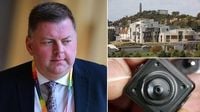Shock and dismay have gripped Scottish politics after Colin Smyth, a Member of the Scottish Parliament (MSP) for South Scotland, was accused of placing a secret camera in a toilet at the Scottish Parliament in Edinburgh. The allegations, which surfaced in August 2025, come on the heels of Smyth’s suspension from the Labour Party earlier in the month over a separate charge of possessing indecent images of children. The developments have left both the public and political colleagues reeling, as the gravity and sensitivity of the situation continue to unfold.
According to BBC Scotland News, the Parliament’s corporate body, known as the Scottish Parliamentary Corporate Body (SPCB), revoked Smyth’s building access amid the ongoing criminal investigation. In an email to staff, the SPCB acknowledged the distressing nature of the charges and reminded all who work at Holyrood or in constituency offices of the confidential support services available. The Parliament’s chief executive, David McGill, took the unusual step of directly informing MSPs that Smyth would be denied access to the building ahead of Holyrood returning from recess the following week. “We recognise the nature of the criminal charges and the ongoing investigation may be upsetting for colleagues and cause distress,” McGill wrote.
Police Scotland executed a warrant at Smyth’s home in Dumfries on August 5, 2025, arresting and charging him in connection with the possession of indecent images of children. Shortly after, reports emerged that Smyth would also face a further charge related to the alleged placement of the secret camera at Holyrood. As detailed by The Daily Record and confirmed by several senior political figures, police searched both the ladies’ and gents’ toilets near the debating chamber—facilities used not only by MSPs but also by journalists and the general public. One senior MSP told the Scottish Daily Mail, “Holyrood’s been swarming with cops all day. They’ve been searching both the ladies and gents toilets near the debating chamber which are used by MSPs, journalists and members of the public. We have visits by different groups every day. Any visitors who used a parliament toilet will be horrified by the investigation.”
In the wake of these revelations, Smyth’s parliamentary pass was formally deactivated, and all building users were notified. A spokesperson for Holyrood stated, “Given the ongoing criminal investigation, the SPCB took the decision to deactivate Colin Smyth’s parliamentary pass. We have informed all building users at Holyrood.” The Parliament also emphasized the availability of support and counselling services for staff, acknowledging the emotional toll the investigation may have on employees and MSPs alike.
Smyth, who previously served as Scottish Labour’s general secretary from 2008 to 2012 and entered Holyrood as an MSP in 2016, has held a series of party frontbench roles, including as transport spokesman and, more recently, as spokesman on the constitution and external affairs. Following the charges, he was suspended from Scottish Labour and is now listed as an independent MSP on the parliamentary website. A Scottish Labour Party spokesperson told BBC Scotland News, “Swift action was taken after we became aware of these serious allegations. Colin Smyth MSP is an independent MSP. We cannot comment further on these deeply concerning developments while legal proceedings are ongoing.”
Despite being barred from the Parliament building, Smyth could still participate in debates and vote remotely, thanks to systems established during the COVID-19 pandemic. This arrangement, set up to allow for remote parliamentary work, means that Smyth’s voice could still be heard in Holyrood’s proceedings, even as his physical presence is forbidden.
For his part, Smyth has consistently denied the allegations regarding the secret camera. In a statement issued after his arrest, he said, “These events have come as a shock and this is a deeply stressful time. I am obviously co-operating fully with any inquiries and hope the matter can be resolved quickly.” Speaking to The Daily Record about the camera allegations, he added, “This allegation has come as an utter shock and is causing deep distress. I refute this claim and want to make clear that I will fully cooperate with any ongoing inquiry. At this stage, for legal reasons I am not able to comment on the specific matters or speculation but I sincerely hope this process will conclude quickly and fairly. The ongoing speculation and the decision by the police to release information, including my home address, has been absolutely devastating and has had a profound impact on my health.”
Smyth’s background adds a further layer of complexity to the case. A married father and former modern studies teacher, he has spoken publicly about his family and his career in education. Before entering parliament, he served as a councillor and has been a prominent figure in Scottish Labour for well over a decade. His suspension and the subsequent criminal charges have not only ended his formal association with the party but have also placed his political future in serious doubt.
The charges against Smyth have sent shockwaves through the Scottish Parliament, which now finds itself the focus of a criminal investigation. Police Scotland confirmed that the investigation is ongoing and that Smyth is due to appear at Dumfries Sheriff Court at a later date in connection with both the indecent images and camera allegations. The Parliament building itself briefly became a potential crime scene as detectives conducted searches and gathered evidence.
Political colleagues and the wider public have expressed concern about the impact of the allegations on Holyrood’s reputation. As one senior MSP noted to the Scottish Daily Mail, the investigation has left many feeling unsettled, particularly given the high level of public access to the Parliament’s facilities. The swift action taken by the Labour Party and the Parliament’s corporate body has been widely noted, with support services quickly made available to those affected.
As the legal process unfolds, attention will remain focused on the outcome of the investigation and the implications for both Colin Smyth and the Scottish Parliament. For now, the case stands as a stark reminder of the challenges and scrutiny faced by public officials, and the importance of transparency and due process in addressing allegations of this gravity.
The coming weeks are likely to bring further developments as the courts consider the charges and the Parliament continues to grapple with the fallout. For many at Holyrood and beyond, the hope is that the situation will be resolved fairly and swiftly, restoring confidence in the institutions at the heart of Scottish democracy.



